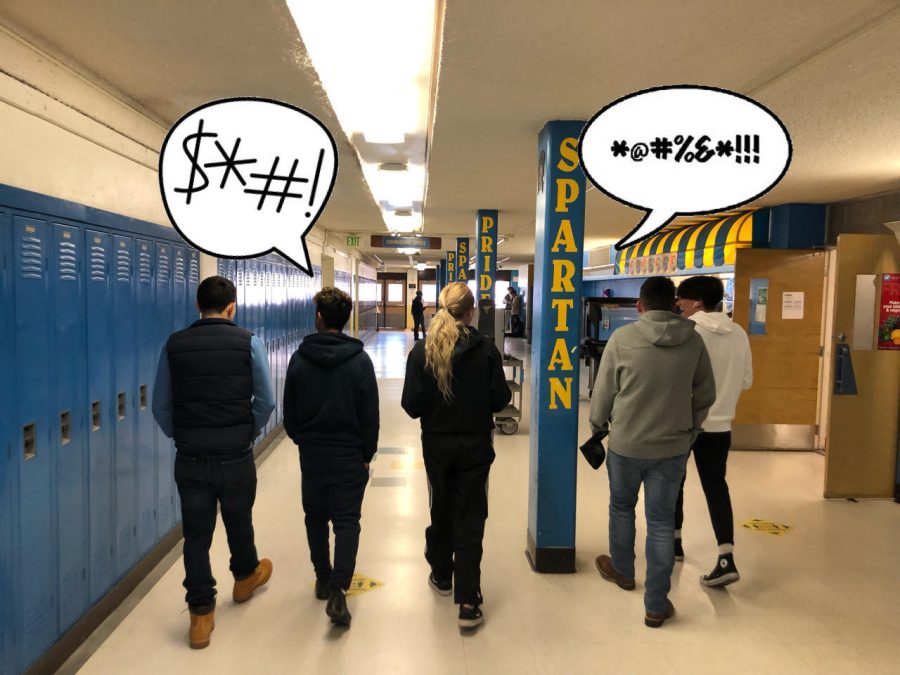Cussing up a storm: When does student language become profane?
The Greeley West hallways are littered with profanity at all times of the day, as shown in this photo illustration.
January 13, 2022
Some Greeley West teachers believe that student vocabulary isn’t as articulate as it used to be many years ago, particularly with the constant peppering of slang in the academic setting. But they do acknowledge there is no shortage in the amount of foul language often used in the classroom. Should this be tolerated? And further, should students be allowed to say such things in the classroom, whether recognized by the teacher or not?
The profanity is everywhere and is spread equally by freshmen and seniors alike. From physical education to math classes, bad words are everywhere. Sophomore Sergio Garcia has grown accustomed to it and barely even notices. He said he, believes that it’s “kinda whatever,” and says that, “it doesn’t really bother me but isn’t appropriate in some places.”
As Garcia claims, it isn’t appropriate in certain spaces. But where would this language be considered casual or appropriate? Sophomore, Israel Harnandez believes the usage of the word makes all the difference. “As long as it’s not harmful towards a person it doesn’t matter,” Harnandez said.
Even though some students are comfortable with it and have become accustomed to the language usage, some still remain uncomfortable. Many teachers say that it’s not appropriate for utilization in a classroom setting.
The usage of this language doesn’t stop in the classroom either; it’s even worse in West’s hallways. Students use foul language even more in the halls than they do in classrooms. Recently, principal Jeffery Cranson asked students to monitor their language during the daily morning announcements, saying that were visitors in the building had become offended very quickly when walking the hallways of Greeley West.
Sophomore Mariana Ortiz said that she hears the language “every second” in the hallways and that it’s “really bad.” Ortiz thinks it could be remedied by “teachers calling out students.”
When calling out students, teachers create an environment where the student being corrected has to stop and think about how their language is affecting others, and maybe even themselves. This could help correct the language problem if enforced regularly, but a lot of teachers said students just shrug it off and continue the profanity around the corner.
Greeley West assistant principal Ms. Amy Zulauf said these behaviors happen “everyday.” She added, “It’s my hope to help students learn how to shift their language depending on the situation they are in.”
Zulauf claimed that in addition to hearing this language, “Some students don’t even notice that they’ve used inappropriate language for the situation they are in.”
Situational awareness varies from student to student, however. Experience with the language on social media and at home often results in students blurting out the word without thinking about it. Everybody else in the classroom notices..
That’s why Zulauf makes an attempt to correct this language whenever she hears it. She said that, “Most students are respectful and understand why we address this language.”
Zulauf said it is a never ending quest to improve the vocabulary. “I try to address it when it happens to the best of my ability,” Zulauf said.
Although some students are respectful when corrected, others are reluctant. Sophomore Maddy Mese strongly believes that teachers oppress the ability to speak in this way, stating “They don’t want to deal with the conflict behind it, so when it’s brought up it’s immediately shot down a lot of the time.”
Mese said there should be a conversation about how kids speak these days, but neither side wants to have that conversation. “It should be something people feel comfortable with talking about, not scared that they would get in trouble,” Mese said.
Mese said that students should be able to use these words without consequence. “They should get in trouble if they are using them in a way where they’re trying to offend someone, but I think at the end of the day, a word shouldn’t be ‘banned’ because some people find them wrong,” Mese said.
That won’t stop Language Arts teacher Ms. Amy Tuttle from trying to stop the trend. Tuttle said that the words are ingrained in students. “People become used to something that’s around them all the time,” Tuttle said. “Children often hear it from a young age.”
In the end, Tuttle just believes there’s a better word to use. “Foul language is a cheap form of communication. It keeps children from expressing how they’re truly feeling,” Tuttle said. “(It’s just) less articulate.”
Although West’s walls hear this language all the time, Tuttle said it’s time to make efforts to break the cycle. “I have a zero tolerance policy for this language,” Tuttle explained. “I don’t say these things and offend others, so I expect the same of my students.”




